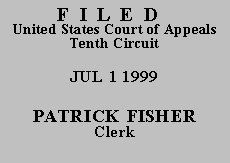

|
LEWIS THEODORE WACKER; JOHN LEE WACKER; EDITH FAYE WACKER, |
|
Before TACHA, McKAY, and
MURPHY, Circuit Judges.
Proceeding pro se, Plaintiffs, each incarcerated in separate penal institutions, brought a civil rights action seeking monetary damages in excess of $5,000,000 payable in gold coin. Construed liberally, Plaintiffs' complaint ostensibly alleged several violations of their civil rights. Plaintiffs' main claims revolved around their allegation that the United States District Court for the District of Kansas had no jurisdiction over Plaintiffs because the American flag displayed in the federal courtroom was adorned with a yellow fringe. Plaintiffs claimed the inclusion of the yellow fringe on the flag effectively commuted the district court into a foreign power. Plaintiffs' complaint also included a claim that two of the defendants, a federal district judge and a federal magistrate judge, engaged in constructive treason because they presided in a courtroom that displayed the yellow-fringed flag. Although Plaintiffs' complaint also provides full or partial citations to a plethora of statutes, the remainder of the complaint is indecipherable.
The district court held that Plaintiffs' complaint failed to state a claim upon which relief may be granted and dismissed the complaint with prejudice. In its Order, the district court adequately and coherently set forth the reasoning underlying the dismissal. The district court denied Plaintiffs' subsequent motion for reconsideration.
In their appellate brief, Plaintiffs purport to reassert the same allegations first appearing in their complaint. In addition, Plaintiffs attempt to add a claim that their Constitutional rights have been violated by the capitalization of their names in court documents. The remainder of Plaintiffs' appellate brief contains pages of desultory verbiage that has no application to either their original complaint or their appeal of its dismissal.
Upon de novo review of Plaintiffs' complaint, the district court's Order, and the entire record on appeal, this court concludes that Plaintiffs' appeal is frivolous and malicious. Accordingly, this court dismisses Plaintiffs' appeal pursuant to 28 U.S.C. § 1915(e)(2)(B)(i).
The district court's dismissal of Plaintiffs' complaint for failure to state a claim counts as a "prior occasion" for purposes of 28 U.S.C. § 1915(g). Our dismissal of Plaintiffs' appeal also counts as a "prior occasion" for purposes of 28 U.S.C. § 1915(g).
Plaintiffs' appeal is DISMISSED.
ENTERED FOR THE COURT:
Per Curiam
*. This order and judgment is not binding precedent, except under the doctrines of law of the case, res judicata and collateral estoppel. The court generally disfavors the citation of orders and judgments; nevertheless, an order and judgment may be cited under the terms and conditions of 10th Cir. R. 36.3.